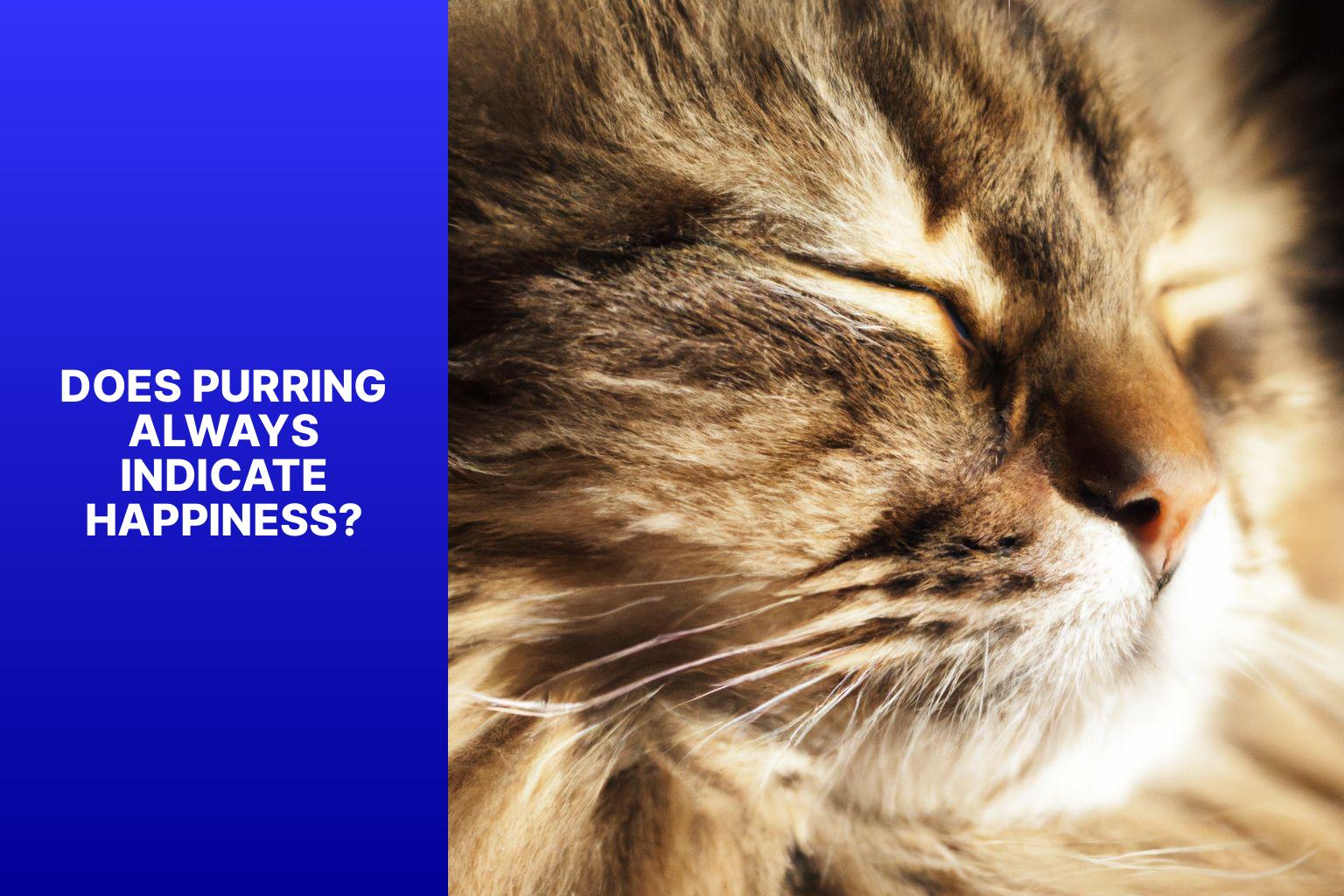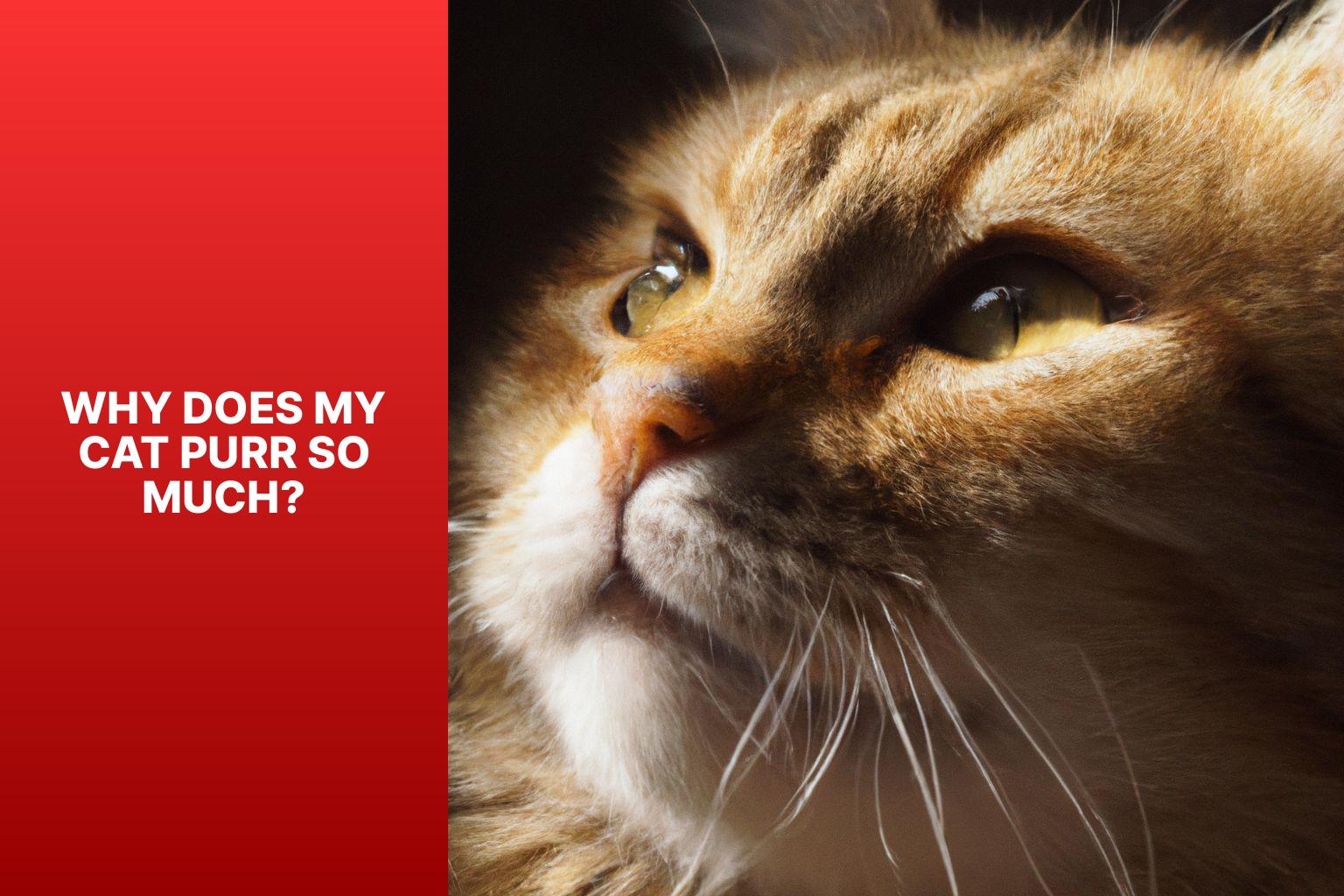Cats are known for their unique ability to purr, which is both fascinating and endearing to their human companions. Understanding why cats purr can provide insight into their behavior and help strengthen the bond between cat and owner.
What Is Purring? Purring is a vibrational sound produced by cats that is often associated with contentment and relaxation. It is a soft and rhythmic sound that can be felt when you stroke your cat or they are in a state of calm and comfort.
There are several reasons why cats purr, and it goes beyond just expressing happiness. They purr to communicate, heal, seek attention, and more.
- Contentment and Happiness: Purring is commonly associated with a cat’s state of contentment and happiness. It is their way of expressing pleasure and relaxation.
- Communication: Purring can be a form of communication between cats and their owners or other animals. It can signify a desire for attention, companionship, or even a sign of submission.
- Healing and Relaxation: Cats have been observed to purr when they are injured or experiencing pain. It is believed that the vibrations generated by purring can aid in the healing process and provide comfort to the cat.
- Seeking Attention: Some cats may purr excessively as a way of seeking attention from their owners. They may use purring as a signal to indicate that they want to be petted or played with.
While purring is often associated with positive emotions, excessive purring may indicate other underlying issues.
So, why does your cat purr so much? It could be due to affection and bonding, anxiety or stress, illness or discomfort, or even hunger or thirst. Cats may use excessive purring as a way to seek comfort or attention when they are feeling uneasy or unwell. It is important to pay attention to their behavior and look for any other signs of distress.
If your cat is purring excessively and it is out of the ordinary, it is recommended to consult a veterinarian. A vet can help determine if there is an underlying medical issue that needs to be addressed.
Key takeaway:
- Cats purr to communicate: Purring can indicate contentment and happiness, but it can also serve as a mode of communication between cats and their owners or other animals.
- Purring for healing and relaxation: Cats often purr when they are in a relaxed state or trying to heal themselves. The vibrations from purring can aid in the recovery process.
- Excessive purring may indicate underlying issues: While purring is primarily a positive sign, excessive purring can indicate anxiety, stress, illness, discomfort, or hunger. It is important to monitor your cat’s behavior and consult a veterinarian if necessary.
Why Do Cats Purr?
Why Do Cats Purr?
Cats purr for various reasons, including contentment, relaxation, and communication. Purring can indicate happiness but also other emotions like anxiety or pain. Cats purr by vibrating their vocal cords.
Purring has benefits for cats. It releases endorphins, reducing stress and promoting relaxation. Purring can also soothe cats in different situations and communicate their needs for attention or affection to humans.
Not all cats purr. Some breeds, like the Siamese, purr less frequently. Medical conditions can also affect a cat’s ability to purr.
Pro Tip: If your cat is purring excessively or differently than usual, monitor their behavior and consult a veterinarian if concerned. They can ensure your cat’s well-being.
What Is Purring?
Purring is a behavior exhibited by cats that involves vibrating to make a sound. What Is Purring? It serves different purposes for cats. Cats purr when they are content and happy, when they want to communicate their feelings, when they need healing and relaxation, or when they want attention. Understanding what purring means can help cat owners take better care of their cats. It’s important to note that not all cats purr, and excessive purring may indicate health issues. If a cat’s purring behavior changes or becomes excessive, it’s advisable to consult a veterinarian.
Reasons Why Cats Purr
Cats purr for various reasons, and understanding why can unveil fascinating insights into their behavior and emotions. In this section, we’ll explore the different motivations behind a cat’s purring. From contentment and happiness to communication and seeking attention, we’ll unravel the hidden meanings behind these delightful vibrations. Get ready to dive into the captivating world of feline purrs and discover the multifaceted reasons behind this enchanting phenomenon!
1. Contentment and Happiness
Cats purr when they are content and happy. This creates a soothing environment for them and their owners, promoting their overall well-being. Purring is a natural behavior that provides physical satisfaction, relaxation, and ease for cats.
They may purr to seek attention or show affection towards companions and family members, communicating their feelings and strengthening the bond. Studies have shown that purring has healing benefits, such as aiding in bone healing, tendon repair, and pain reduction.
Cats tend to purr more in relaxed environments where they feel safe and comfortable. If a cat purrs excessively, it is important to observe any physical signs like difficulty breathing or unusual behavior and consult a veterinarian to rule out any medical issues.
To ensure contentment and happiness in cats, it is recommended to provide cozy resting places, regular petting time, attention, and high-quality food. By creating a relaxed environment and bonding with a cat, their overall well-being can be effectively enhanced.
2. Communication
One reason cats purr is to communicate with their owners and other cats. Communication is essential to their behavior and can convey various messages. Here are some ways cats use purring to communicate:
1. Expressing contentment and happiness: Cats purr when they are relaxed and content, showing they are in a pleasant mood.
2. Seeking attention: Cats may purr to get their owner’s attention, indicating they want affection or interaction.
3. Bonding: Mother cats purr to communicate with their kittens and create a strong bond, reassuring and comforting them.
4. Healing and relaxation: Purring has a soothing sound that helps cats calm down and relax. It can also promote healing by reducing stress and pain, for both cats and humans.
5. Communication with other cats: Cats may purr to communicate with other relaxed cats, fostering positive relationships and addressing stress or problem behaviors.
Purring is not limited to domestic cats but is also observed in big cats like lions and tigers. It is believed that purring evolved as a way for cats to communicate with their feline companions and self-soothe. The frequency and intensity of purring may vary among individual cats and situations, but overall, it serves as a vital form of communication in the feline world.
3. Healing and Relaxation
When it comes to healing and relaxation, cats find comfort and soothe themselves through purring. Purring provides cats with physical satisfaction as it releases endorphins, natural painkillers, and helps them relax. It is also a way for cats to relieve stress and promote a sense of calmness.
Purring aids in the healing process by repairing tendons, muscles, reducing inflammation, and strengthening bones. Cats also purr to bond and communicate with their owners or feline companions, expressing positive emotions. It is often associated with a relaxed environment, where cats feel safe and comfortable.
Purring helps cats endure stressful situations and maintain a positive mood. Understanding the benefits of purring can help cat owners create a calm and soothing environment for their furry friends. Paying attention to cats’ body language and physical signs can ensure their well-being and address any underlying issues associated with excessive purring.
4. Seeking Attention
Purring is one way cats seek attention. Here are some ways they use purring to seek attention:
1. Approaching and rubbing against you: Cats may purr as they approach you and rub their body against your legs to seek your attention and affection.
2. Meowing and purring combination: Cats may combine purring with meowing to communicate their desire for interaction or a specific need, like food or playtime.
3. Curling up on your lap: When a cat curls up on your lap and purrs, it means they want your attention and physical presence. They find comfort and security in being close to their human companions.
4. Following you around: Cats may follow you around the house, purring to seek your attention and company. They enjoy being near their humans and want to be part of your daily activities.
A I had a cat named Whiskers who always craved attention. Whenever I sat down to read, he would jump on my lap, purring loudly, and nudge the book out of my hands. He wanted me to focus all my attention on him. It was endearing how he would nuzzle his head against my chest, seeking physical affection. Whiskers knew just how to use his purring to seek my undivided attention, and I couldn’t resist giving him all the love he desired.
Does Purring Always Indicate Happiness?
Photo Credits: Www.Catcornerblog.Com by Steven Baker
Purring is often associated with a cat’s happiness, but does it always indicate happiness? While purring can indicate contentment, it can also signal other emotions or physical conditions.
1. Contentment: Cats often purr when relaxed and content. They may purr when petted, lying comfortably, or cuddling with their owners.
2. Stress or Anxiety: Cats may also purr when stressed or anxious. Purring can be a self-soothing mechanism for them during stressful situations.
3. Communication: Purring can serve as a form of communication. Cats may purr to show affection, seek attention, or signal social interactions with other cats or humans.
4. Healing and Comfort: Purring has healing properties, promoting the release of endorphins that enhance a cat’s well-being. Cats may also purr to soothe themselves during discomfort or pain.
It’s important to consider additional cues alongside purring to understand a cat’s emotional state. These cues include body language, vocalizations, and overall behavior. Each cat is unique, and their purring behavior may vary. Observing a cat’s overall behavior and noting any changes can help in understanding the meaning of their purring in different contexts.
Why Does My Cat Purr So Much?
Photo Credits: Www.Catcornerblog.Com by Paul Mitchell
If you’ve ever wondered why your feline friend is always purring away, this section has the answers you need. We’ll dive into the reasons behind excessive purring, exploring topics like affection and bonding, anxiety or stress, illness or discomfort, and hunger or thirst. Get ready to unravel the secrets of your cat’s purrs and gain a better understanding of their communication through this delightful and informative journey.
1. Affection and Bonding
The reasons why cats purr aren’t limited to contentment and happiness. Affection and bonding are also significant factors. Cats purr to show their affection towards their owners or other animals and to strengthen the bond between them. To enhance affection and bonding with your cat, here are some suggestions:
1. Spend quality time playing together or cuddling.
2. Provide a safe and comfortable environment with cozy places to relax.
3. Offer tasty treats and yummy food as a way to show affection.
4. Gently pet and stroke your cat, paying attention to their preferences and body language.
Remember, not all cats purr excessively, and each cat may have different reasons for purring. If you notice any changes in your cat’s purring habits or signs of discomfort, consult a veterinarian for a thorough check-up.
2. Anxiety or Stress
When cats purr excessively, it can be a sign of anxiety or stress. Purring helps cats calm themselves in stressful situations by releasing endorphins. Factors that contribute to a cat’s anxiety or stress include changes in their environment, unfamiliar guests, problem behaviors, and dental issues. Cats can also experience stress in new houses or after medical surgeries. To alleviate your cat’s anxiety or stress, create a relaxed environment, spend quality time with them, and offer treats. Monitor their physical signs and seek a vet check-up if necessary. Understanding your cat’s body language and needs is crucial in managing their anxiety or stress. By providing a calm and secure environment and addressing any underlying issues, you can help your cat overcome stress and create a happy atmosphere for them.
3. Illness or Discomfort
When a cat purrs excessively, it may indicate illness or discomfort. Here are some possible reasons:
-
Pain: Cats may purr when in pain to self-soothe. If your cat is purring more than usual and showing signs of illness or discomfort, such as hiding, being less active, or vocalizing, it could be a sign of an underlying health issue.
-
Injury: Purring can release endorphins that help with pain relief, so a cat may purr when injured or recovering from surgery. If your cat seems to be purring excessively after an injury or surgery, monitor them and seek veterinary care if necessary.
-
Gastrointestinal issues: Cats may purr more when they have an upset stomach or digestive issues. If your cat is purring excessively and also vomiting, having diarrhea, or showing signs of abdominal discomfort, it could be a sign of a gastrointestinal problem that requires medical attention.
-
Urinary issues: Cats with urinary tract infections or other urinary issues may purr more due to discomfort or pain. If your cat is purring excessively and also urinating outside the litter box, straining to urinate, or showing signs of discomfort during urination, consult a veterinarian.
-
Dental problems: Cats with dental issues such as periodontal disease or toothaches may purr more to comfort themselves. If your cat is purring excessively and also drooling, avoiding food, or pawing at their mouth, dental issues may be the cause.
If you notice any changes in your cat’s behavior or excessive purring accompanied by other concerning signs, consult with a veterinarian. They will determine the cause of the excessive purring and provide appropriate treatment. Providing a calm and comfortable environment for your cat and addressing any underlying medical issues can help alleviate their illness or discomfort.
4. Hunger or Thirst
When a cat purrs excessively, it may be a sign of hunger or thirst. Possible reasons for a cat’s excessive purring due to hunger or thirst include:
1. Physical satisfaction: Cats may purr to communicate their hunger or thirst to their owners.
2. Attention seeking: Cats may purr to get their owners’ attention and indicate that they are ready to be fed or given water.
3. Cozy place: Cats may associate food and water with a cozy and safe environment, leading them to purr when they are hungry or thirsty.
4. Good mood: Being hungry or thirsty can put cats in a positive emotional state and enhance their overall well-being, leading them to purr.
If your cat is purring excessively because of hunger or thirst, it is important to ensure that they have access to food and water. Provide them with a clean and fresh water bowl, and make sure their food is nutritious and suited to their dietary needs. If you are concerned about your cat’s excessive purring, especially if it is accompanied by weight loss or changes in behavior, it is recommended to schedule a vet check-up to rule out any underlying medical conditions.
What Should I Do If My Cat Is Purring Excessively?
If your cat is purring excessively, consult with a veterinarian to address the issue.
Excessive purring may indicate an underlying health problem.
Observe your cat’s behavior for signs of discomfort or distress.
Excessive purring could be a result of pain or illness.
Make an appointment with your veterinarian for a thorough examination.
The vet can identify any underlying medical conditions causing the excessive purring.
Provide a peaceful and stress-free environment for your cat.
A cozy bed, toys, and a scratching post can help keep your cat relaxed and entertained.
Ensure your cat has a balanced and nutritious diet appropriate for their age and health condition.
Offer affection, praise, and attention to your cat when they are not excessively purring.
This will help redirect their behavior and encourage positive interactions.
Remember, consult with a veterinarian to determine the best course of action for your specific cat if they are purring excessively.
Some Facts About Why Cats Purr So Much:
- ✅ Cats purr not only when they are happy or relaxed, but also when they are nervous or in pain.
- ✅ Kittens purr to communicate with their mother and establish a bond.
- ✅ Cats may purr to soothe themselves when they are hurt or in pain.
- ✅ Purring can be a way for cats to seek attention from their owners.
- ✅ Purring can release endorphins and help cats cope with stress or discomfort.




